10 Best Meteorology Courses for Beginners in 2024
Find the best meteorology courses to observe and predict the weather including sailing, aviation, extreme weather, and energy generation.
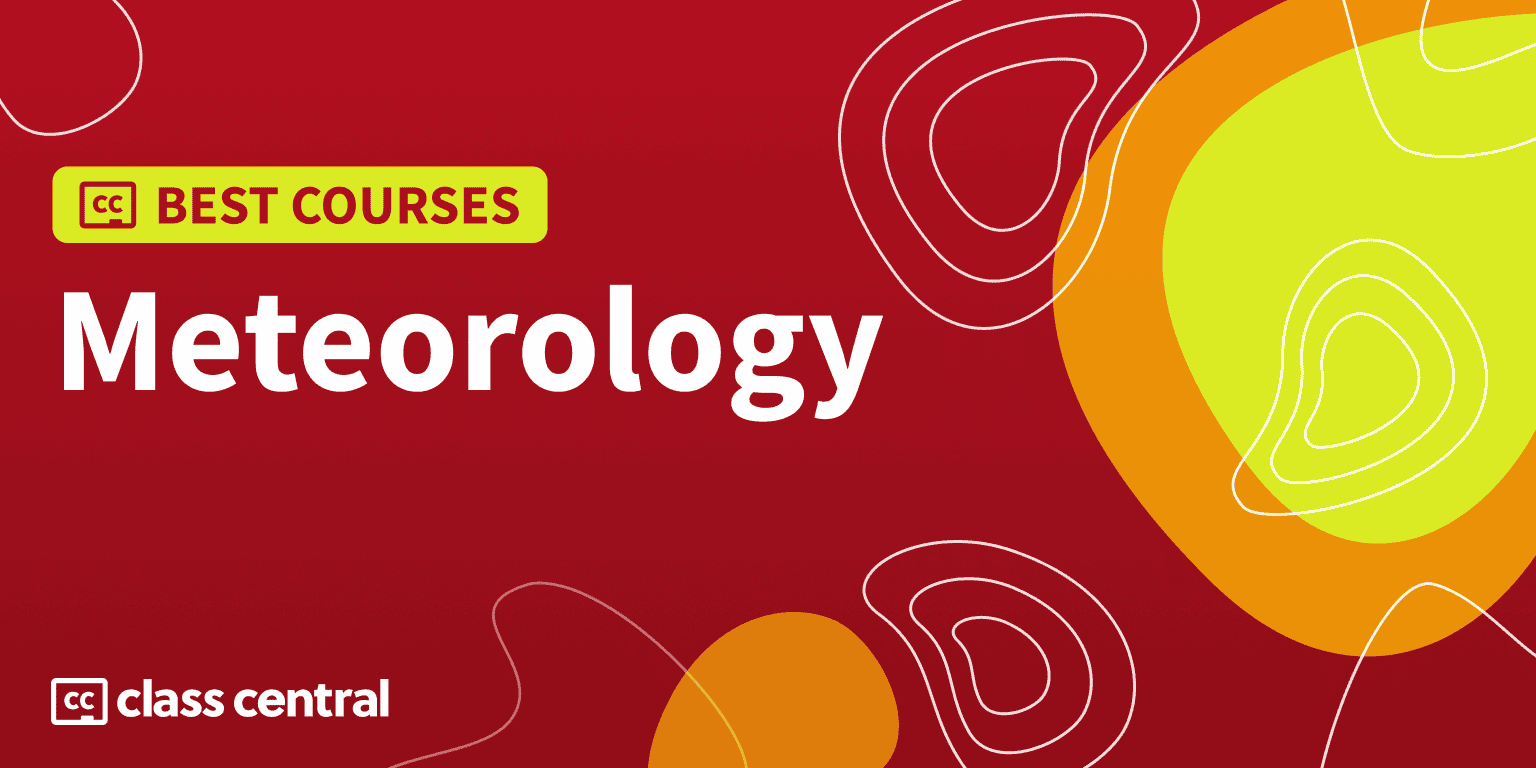
Quick Access:
- Observing Weather: Backyard Meteorology, Understanding Weather
- College Level: Intro to Meteorology, The Monsoon
- Specific Circumstances: Hydro, Wind & Solar power, Meteorology and Sailing.
If you’re interested in meteorology, I’ve collated ratings and reviews from Class Central and course providers to handpick the best meteorology courses from a range of online course platforms for this Best Courses Guide (BCG).
These courses are created by well-known institutions: Harvard and MIT among others. I’ve also thrown in some super offerings from The Open University, University of Barcelona, and École Polytechnique for good measure.
My father was a farmer and knew countless signs to predict the weather. If the kookaburras laughed during the day, it was going to rain. If the frogs croaked, if a blue ibis walked on the farm, yes, it was going to rain. A red sunset? He knew the next morning would be extra cold. And although sometimes his forecasts were spectacularly wrong, his reading of the winds and clouds was as reliable as the weather bureau. In those days the bureau couldn’t consistently predict the weather more than a day or so ahead.
In the 40 years since my dad stopped farming, weather forecasting has come ahead in leaps and bounds. Satellite observations, more precise instruments, and advances in computing and AI have meant we can now predict the weather more accurately and for a longer time into the future. Read on to discover the best meteorology courses for online learners.
Click on the shortcuts for more details:
- Top Picks
- What is Meteorology?
- Courses Overview
- Interesting Sites
- Why You Should Trust Us
- How We Made Our Picks and Tested Them
Here are our top picks
Click on one to skip to the course details:
What is Meteorology?
Meteorology is the study of the weather, including observations and forecasts. Although humans have been trying to understand weather trends for millennia, precise instruments and analysis have only been available recently. Now we can make detailed observations of the entire depth of the atmosphere, and use computers to amalgamate the results and create more accurate forecasts than ever before.
Knowledge of the weather is critical, from simple issues of whether or not to take an umbrella when going out, to agriculture, aviation, and maritime contexts, where bad weather can mean the difference between life and death.
The difference between weather and climate is neatly summed up in the saying “the climate is what you expect; the weather is what you get”, frequently attributed to Mark Twain.
Courses Overview
- 8 courses are free or free-to-audit and 2 are paid
- 6 courses offer a certificate of completion, one of these is free
- The Meteorology subject is followed by 995 learners on Class Central
- The most featured provider is YouTube with 3 courses.
Best General Meteorology Course (Harvard)
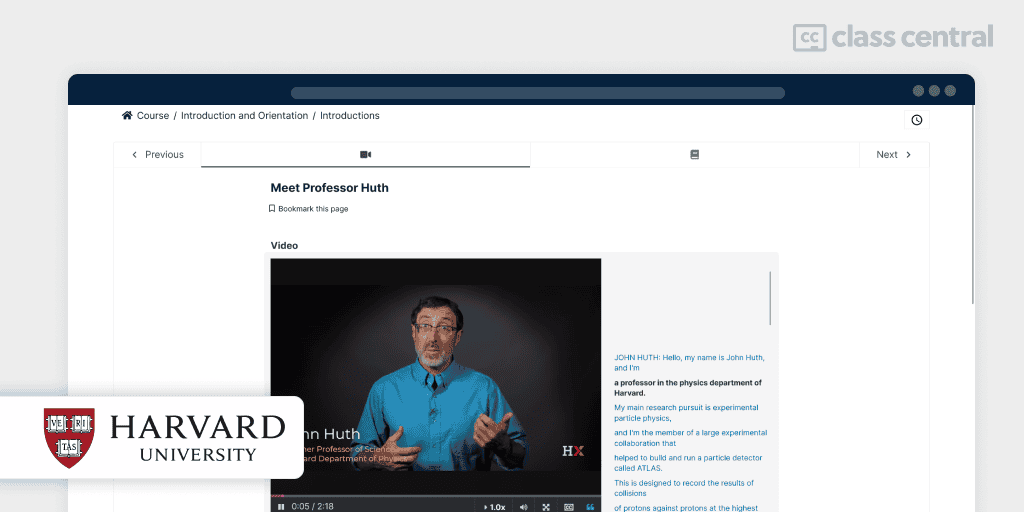
Backyard Meteorology: The Science of Weather delves into the fundamentals of weather forecasting, emphasizing the development of observational skills to predict weather without modern instruments or computer models. It aims to provide a comprehensive understanding of meteorology through a blend of historical methods and modern science.
This course will teach you:
- Weather fundamentals: physical processes, role of winds, weather masses, clouds, and fronts
- Advanced weather systems: examination of other weather systems beyond the basics, the impact of global forces on climate systems
- Weather prediction: techniques and methods, linear vs. non-linear systems, limits of prediction in observational and computer models.
“This course is great for beginners, its not easy and not to hard … I learned so much just in the first slide…” – Baylee Lantaff, Class Central learner.
| Provider | edX |
| University | Harvard University |
| Instructor | John Huth |
| Time Commitment | 18-30 hours |
| Enrollment | 100K |
| Rating | 4.8/5.0 (24) |
| Cost | Free audit |
| Certificate | Paid |
Best Meteorology Course with Transferable Credit (Study.com)
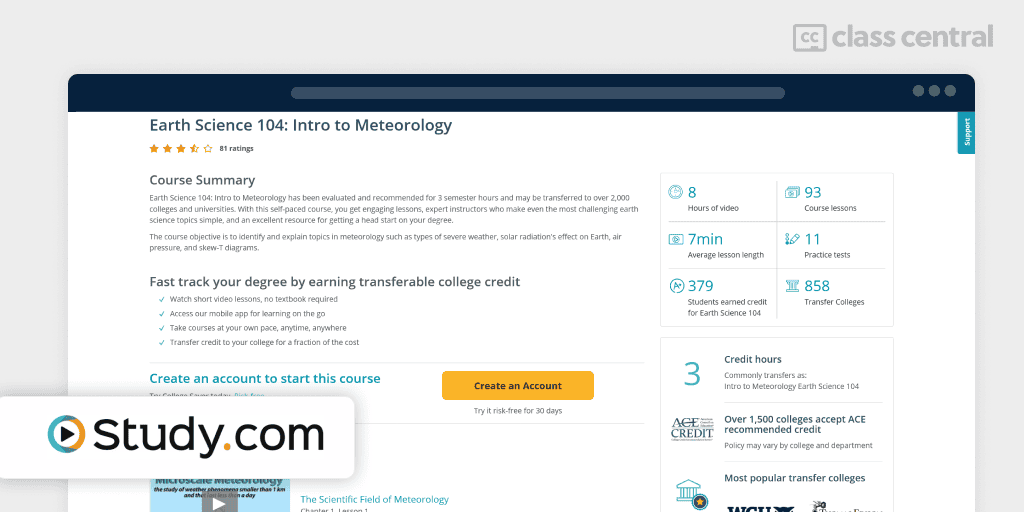
Recommended for 3 semester hours for approved institutions, Earth Science 104: Intro to Meteorology is ideal for anyone looking to gain a solid understanding of weather phenomena, atmospheric conditions, and climate change. Through engaging lessons and expert instruction, you will explore key concepts and theories in meteorology, making it an excellent resource if you’re seeking to advance your education in earth sciences.
If you want this course for college credit, check with your academic institution.
Syllabus:
- Foundations: meteorology terms & key concepts, structure & layers of Earth’s atmosphere
- Sun-Earth atmospheric interactions: solar radiation’s effect on Earth, atmospheric Moisture & cloud formation
- Atmospheric dynamics: air pressure & wind, skew-T diagrams & atmospheric instability
- Weather patterns and systems: air masses, fronts, midlatitude cyclones, and severe weather types overview
- Meteorological practices: forecasting methods
- Climate studies: climate & climate change.
| Provider | Study.com |
| Time Commitment | 12-13 hours |
| Views | 340K |
| Cost | Paid |
| Certificate | Transferable Credit |
Also Great Meteorology Course (University of Reading)
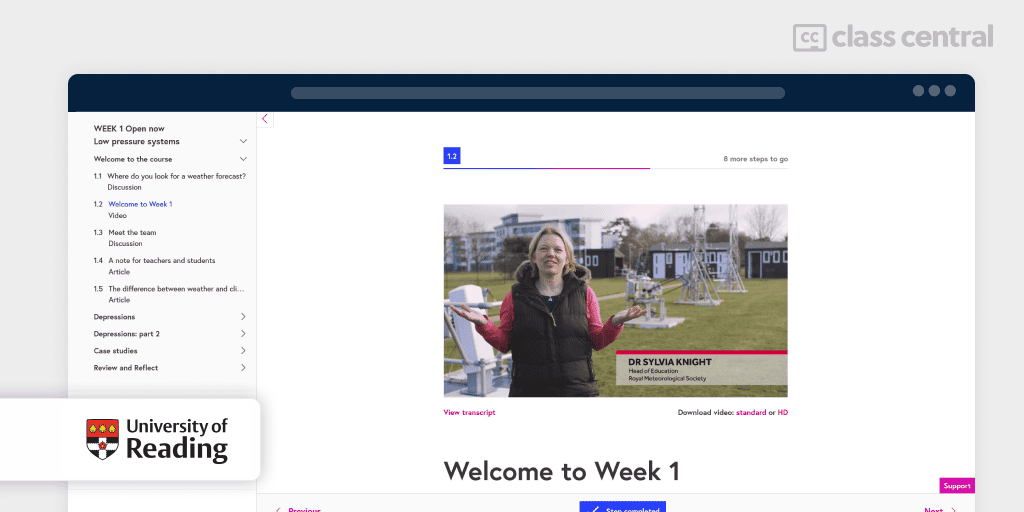
If you’re a beginner with an interest in meteorology or an educator looking to enhance your teaching, Come Rain or Shine: Understanding the Weather looks at the physical processes behind UK weather systems. Engage in practical activities, fieldwork, and experiments to understand cloud formation, the Coriolis effect, air masses, and other weather phenomena.
In this course, you’ll learn:
- Understanding low pressure systems: exploring depressions and their impacts, in-depth look and case studies on low pressure systems
- High pressure, rain, and air masses: jets, conveyors, and dynamics of faster cold fronts, understanding different air masses, types of rain and their formation, anticyclones and their effects, conducting fieldwork
- Global weather patterns and controls: Earth’s energy budget, global atmospheric circulation patterns, tropical weather systems including El Niño, monsoons, and tropical cyclones, exploring other significant weather systems.
“An interesting and informative course. It teaches the basics of reading a synoptic chart, provided a few interesting experiments, and looked at the myriad of agents influencing weather, climate and weather prediction.” – Carol Fitzgerald, Class Central learner.
| Provider | FutureLearn |
| University | University of Reading |
| Instructors | Peter Inness and Sylvia Knight |
| Time Commitment | 9 hours |
| Enrollment | 44K |
| Class Central Rating | 4.8/5.0 (273) |
| Cost | Free audit |
| Certificate | Paid |
Best Meteorology Course with Free Certificate (The Open University)
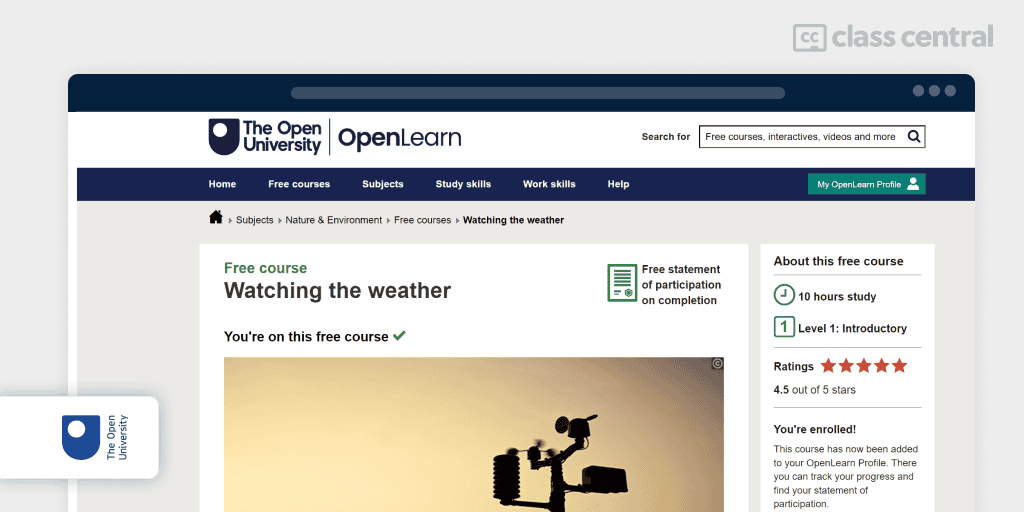
Watching the weather is a free course offered by The Open University, focusing on the various methods of meteorological observations. It covers how weather data is collected from the Earth’s surface, from space, and from the air. This comprehensive network of data collection is crucial for weather forecasting and has a significant impact on daily life. The course is designed to provide an understanding of the importance and methods of weather observation on a global scale.
What you’ll learn:
- Weather from the surface: what elements are recorded and why, manual and automated weather observations, importance of a global perspective in weather recording
- Satellite observations: role of satellites, differences between visible and infrared spectrums, comparisons between satellite and ground observations, observing weather using different frequencies, accessing satellite images
- Filling in the middle: aerial and balloon observations, radiosondes for upper atmosphere data, role of precipitation radar, using aircraft for weather data collection.
“Very interesting introductory course. Made me think about ‘how’ weather forecasts are made and the limitations that forecasters face.” – Stuart Tormey, OpenLearn learner.
| Provider | OpenLearn |
| Institution | The Open University |
| Time Commitment | 10 hours |
| Rating | 4.5/5.0 (12) |
| Cost | Free |
| Certificate | Free |
Best Course on Extreme Weather (The Great Courses Plus)
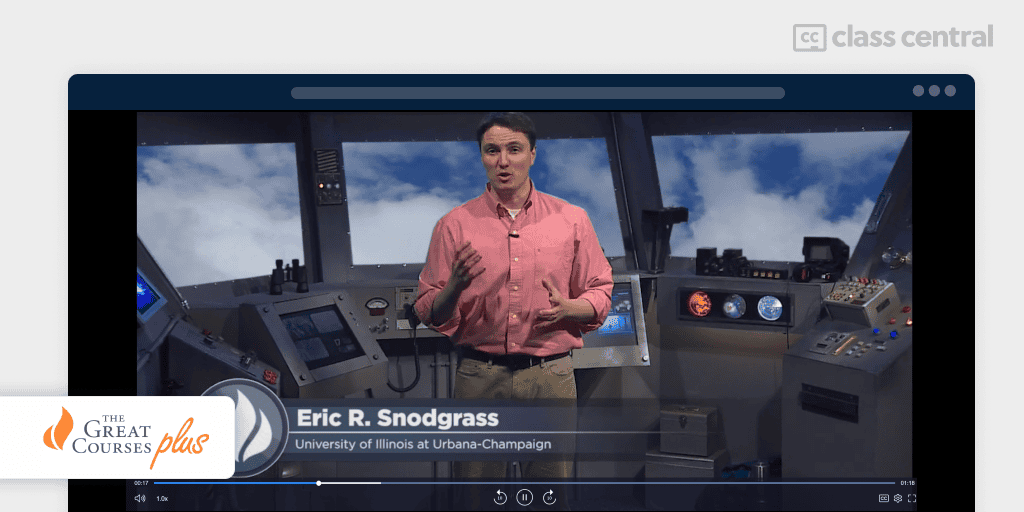
Eric R Snodgrass is a storm-chasing meteorologist who explored the world’s most extreme weather phenomena before creating The Science of Extreme Weather. You’ll learn about the science behind tornadoes, hurricanes, blizzards, and more, gaining insights into how these events form, their impact, and survival strategies. The course utilizes radar and satellite technology to track severe weather, offering a comprehensive understanding of the forces shaping our climate.
Course syllabus:
- Understanding weather basics: temperature extremes and cold-air outbreaks, low pressure and Earth’s high winds, extreme humidity, rain, and fog
- Weather detection technologies: how radar reveals storms, how satellites track severe weather
- Lightning and thunderstorms: anatomy of a lightning strike, lightning extremes and survival, thunderstorm formation and weather balloons, wind shear and severe thunderstorms, squall line thunderstorms and microbursts, supercell thunderstorms and hail
- Tornadoes: amazing winds, tornadogenesis and storm chasing
- Winter weather phenomena: mountain windstorms and avalanches, ice storms: freezing rain, epic snowfall and the Lake Effect, blizzards and winter cyclones
- Water-related weather events: flash floods and deadly moving water, drought, heat waves, and dust storms
- Hurricanes: where hurricanes hit, the enormous structure of a hurricane, storm surge and hurricane intensification
Eric R. Snodgrass is the Director of Undergraduate Studies for the Department of Atmospheric Sciences at the University of Illinois at Urbana-Champaign. Each year, Professor Snodgrass guides more than 1,500 University of Illinois students through the wild side of weather in his popular course Severe and Hazardous Weather.
Also by The Great Courses Plus: Meteorology: An Introduction to the Wonders of the Weather (12 hours).
“This is a very solid explanation of weather, starting with the physical, thermodynamic and electrical properties of air and water as they combine to create severe storms, drought and flood…” – H.W., Great Courses Plus learner.
| Provider | The Great Courses Plus |
| Instructor | Eric R Snodgrass |
| Time Commitment | 13 hours |
| Rating | 4.4/5.0 (78) |
| Cost | Paid |
| Certificate | Not available |
Best Free Course on the Indian Monsoon (Indian Institute of Science Bangalore)
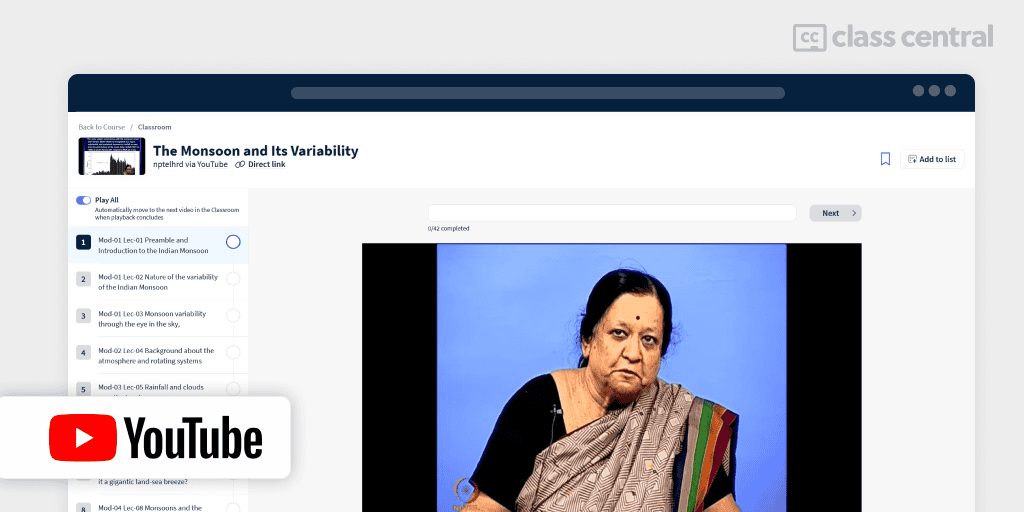
The Monsoon and Its Variability, from 2015, is designed to provide a comprehensive understanding of the Indian Monsoon, its characteristics, variability, and impacts. It covers the fundamental aspects of monsoon systems and delves into seasonal transitions, climatic impacts on agriculture, and the challenges in monsoon prediction, concluding with an overview of the current state of monsoon research.
Course syllabus:
- Introduction: the atmosphere and rotating systems, nature of the variability of the Indian monsoon through the eye in the sky
- Clouds and rainfall: rainfall and clouds over the tropics, organization of clouds over mesoscale, synoptic scale, and planetary scales
- Monsoon dynamics: evolution of ideas about the system, seasonal variation of tropical circulation and rainfall, is the monsoon a gigantic land-sea breeze?
- Tropical convergence zones (TCZs): TCZs and the Indian monsoon
- Variability and seasonal transitions: variability of organized convection over the tropical oceans, heat lows and the TCZ, monsoonal regions of the world, seasonal transitions, climatic clusters of the Indian region, intraseasonal variation and oscillations
- Oceanic Influences: the tropical oceans, El Nino Southern Oscillation (ENSO), Indian Ocean Dipole and the monsoon
- Impacts and Variability: interannual variation of the Indian summer, monsoon variability, agriculture and GDP
- Prediction and Conclusions: monsoon prediction.
| Provider | YouTube |
| Institution | Indian Institute of Science Bangalore and NPTEL |
| Instructor | Prof. Sulochana Gadgil |
| Time Commitment | 36 hours |
| Enrollment | 16K views |
| Cost | Free |
| Certificate | Not available |
Best Course on Ocean Meteorology and Sailing (University of Barcelona and Fundació Navegació Oceànica Barcelona)
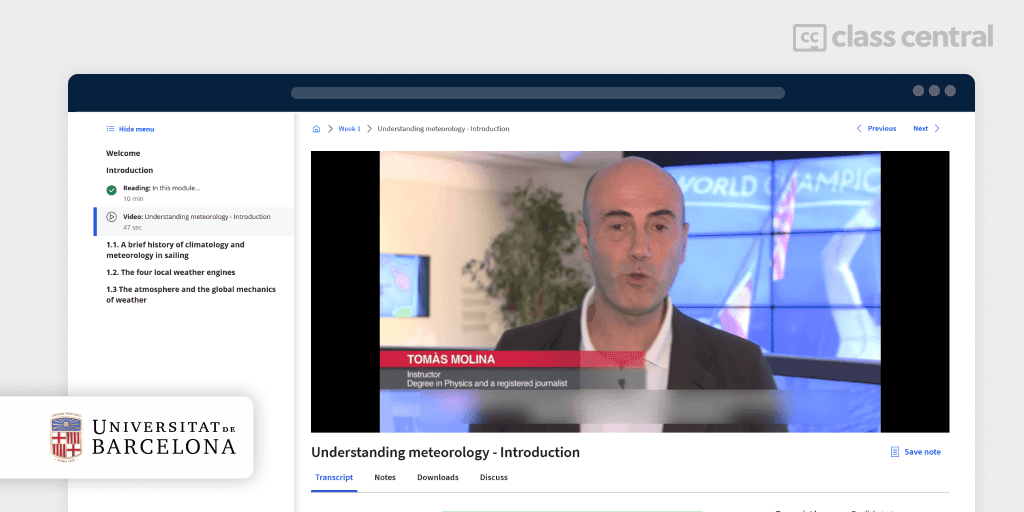
From time immemorial, sailors have needed an intimate knowledge of the weather. Strategies for winning. Meteorology in a round the world regatta studies the intricate relationship between meteorology and ocean regattas, focusing on the Barcelona World Race. It covers the basics of global and oceanic meteorology, predictive modeling, and the use of navigation software and satellite data in sailing. You will learn how weather strategies are crucial in round-the-world regattas, ensuring both competitive success and safety. The course is designed for sailors and enthusiasts keen on understanding weather patterns and their application in sailing strategies.
What you’ll learn in this course:
- Understanding Maritime Meteorology: foundations, weather phenomena and prediction essentials for ocean sailors
- Meteorological Predictions: numerical weather models, forecasting structures: advection, troughs, ridges, barometric swamps, low-pressure systems and basic prediction models used by sailors
- The Sailor as Meteorologist: practical application of meteorology in sailing, decision-making based on wind and weather conditions
- Ocean Regattas and Meteorology: role of meteorology in yacht racing for strategy, tactics, and safety, climatology for the Barcelona World Race, preparations and race management, communication, safety protocols and ice detection, the impact of meteorological conditions on race tactics.
“Awesome course. If you’re into sailing or meteorology there is nothing better. The amount of knowledge conveyed in this short course is immense, yet it’s fun and captivating the whole time.” – K.F., Coursera learner.
| Provider | Coursera |
| Institution | University of Barcelona and Fundació Navegació Oceànica Barcelona |
| Instructor | Tomàs Molina |
| Time Commitment | 19 hours |
| Enrollment | 5.3K |
| Rating | 4.6/5.0 (132) |
| Cost | Free audit |
| Certificate | Paid |
Best Short Course About Meteorology and Aviation (MIT)
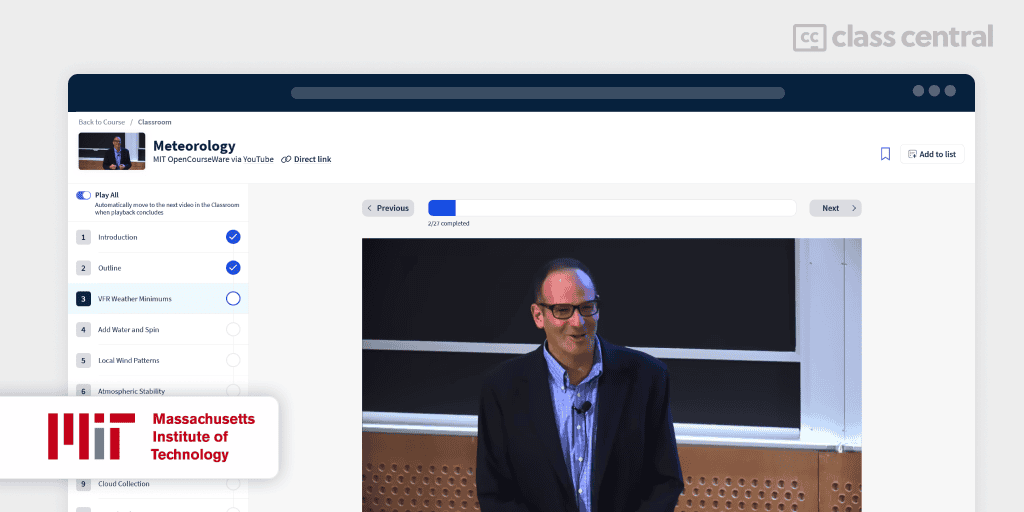
The MIT OpenCourseWare lecture on Meteorology, part of the 16.687 Private Pilot Ground School, IAP 2019, is a concise session on the fundamentals of weather theory, weather patterns, and the hazards they pose to aviation. The course is designed to equip private pilots with the knowledge to make informed decisions based on weather conditions.
Course syllabus:
- Introduction and basics: introduction, outline, VFR weather minimums
- Weather dynamics: add Water and Spin, local wind patterns, atmospheric stability, temperature inversions, frost
- Clouds and precipitation: cloud collection, low and middle clouds
- Weather Systems: airmasses, fronts (cold, warm, and occluded)
- Weather hazards: thunderstorm life cycle and hazards, microbursts, turbulence
- Icing: recognition, flight characteristics, requirements for icing formation, avoiding icing encounters, response to icing, and how transportation airplanes handle it.
“This course is amazing! I learned some informations that i helped me to do a better prediction.” (sic) – Kallianos Ioannis, Class Central learner.
| Provider | YouTube |
| Institution | MIT OpenCourseWare |
| Instructors | Philip Greenspun and Tina Srivastava |
| Time Commitment | 1 hour |
| Views | 33K |
| Rating | 4.7/5.0 (3) |
| Cost | Free |
| Certificate | Not available |
Best Course Exploring Machine Learning’s Role in Weather Forecasting (Society for Industrial and Applied Mathematics)
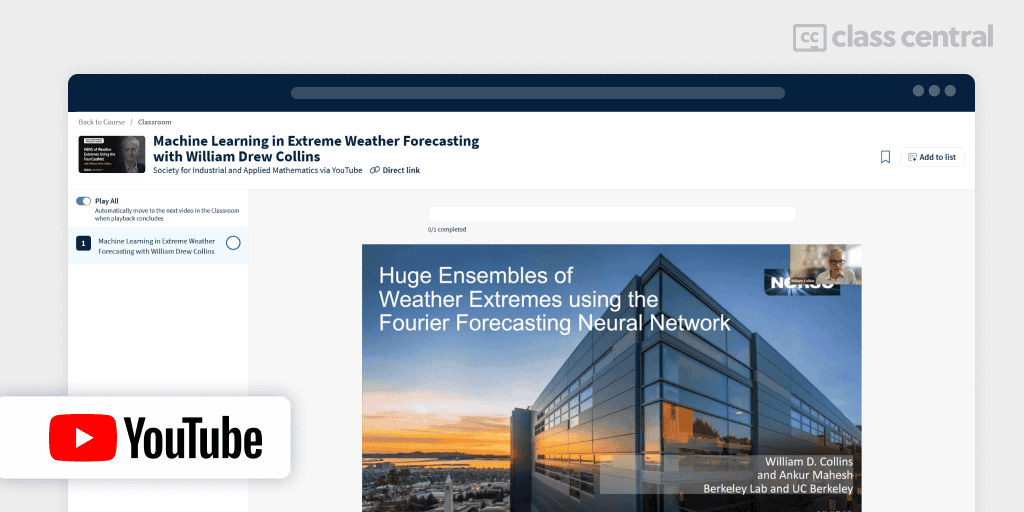
Machine Learning in Extreme Weather Forecasting, posted in December 2023, is a webinar led by William Drew Collins from Lawrence Berkeley National Laboratory. Collins presents the FourCastNet ML algorithm, which significantly reduces computational costs while maintaining high accuracy in modeling atmospheric dynamics. This advancement enables the creation of large ensembles, revolutionizing the study of extreme weather in a warming world.
Syllabus:
- Extreme weather forecasting: challenge of forecasting extreme weather events and limitations of traditional numerical simulations
- Machine Learning in weather forecasting: machine learning (ML) in the context of weather forecasting, overview of the FourCastNet ML algorithm, Fourier neural operators, transformers in modeling chaotic dynamical systems
- Advantages of ML in weather forecasting: computational efficiency and accuracy of ML algorithms, the capability of generating large ensembles (1,000- or 10,000-member), data compression mechanisms to reduce computational and storage costs
- Q&A session: addressing audience questions and clarifications.
“It is a well presented, eloquently delivered. It covers all areas in applying machine learning to extreme weather events monitoring and detection. In a nutshell it is awesome.” – Aliyu Musa Yusuf, Class Central learner.
| Provider | YouTube |
| Institution | Society for Industrial and Applied Mathematics |
| Instructor | William Drew Collins |
| Time Commitment | 1 hour |
| Views | 129 |
| Cost | Free |
| Certificate | Not available |
Best Course Discussing Weather-Based Power Sources (École Polytechnique)
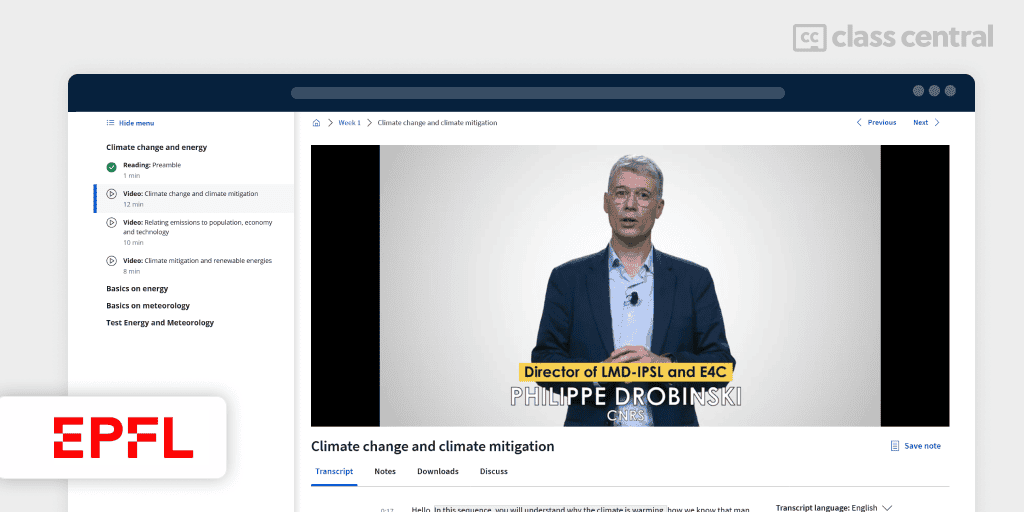
Hydro, Wind & Solar power: Resources, Variability & Forecast covers the estimation of energy resources, the physical causes of their intermittency and variability, and the impact of meteorological changes. The course also explores the methods and tools for forecasting the electricity production of renewable energy plants, which is crucial for their integration into the electricity network. Supported by Ecole Polytechnique and developed in collaboration with the Energy4Climate Interdisciplinary Center, it offers a comprehensive understanding of renewable energy production and its future potential.
In this course:
- Introduction to renewable energy: climate, energy, and meteorology basics
- Renewable energy sources: hydro and fluvial power, wind power, solar power
- Integration and Forecasting: renewable energy integration, forecasting methods and tools for hydro, wind, and solar power production.
“Renewable energy is unpredictable compared to current energy (coal, nuclear etc). This course gives good insight in how the characteristics are measured and what the effects are on a renewable energy system” – Andre S, Coursera learner.
| Provider | Coursera |
| Institution | École Polytechnique |
| Instructors | Jordi Badosa, Alexis Tantet, Philippe Drobinski and Alexandre Stegner |
| Time Commitment | 15 hours |
| Enrollment | 8.8K |
| Rating | 4.6/5.0 (100) |
| Cost | Free audit |
| Certificate | Paid |
Interesting Sites
- The World Meteorological Organisation (WMO) coordinates the international exchange of meteorological data
- Can AI help us predict extreme weather? – YouTube video produced by the United Nations
- Do you love looking at the clouds? See the Cloud Appreciation Society site.
Why You Should Trust Us
Class Central, a Tripadvisor for online education, has helped 60 million learners find their next course. We’ve been combing through online education for more than a decade to aggregate a catalog of 200,000 online courses and 200,000 reviews written by our users. And we’re online learners ourselves: combined, the Class Central team has completed over 400 online courses, including online degrees. I’ve personally completed over 200 online courses in a variety of topics including meteorology.
How We Made Our Picks and Tested Them
Trying to find “the best” can be daunting, even for those of us who live and breathe online courses. Here’s how I approached this task.
First, I combed through Class Central’s Catalog and the internet to find a variety of free and paid open courses, some with certificates. You don’t need to enroll in a university to learn about meteorology.
When choosing courses, I considered the following factors:
- Renowned Institutions: I looked for recognized institutions
- Instructor experience: I sought instructors with extensive experience in meteorology and engaging presentation styles
- Popularity: I checked numbers of enrollments and views to find popular courses
- Course content: I examined courses that covered a range of topics and presentation styles, including the basics and more advanced topics. I watched some course videos to sample courses I hadn’t already taken
- Learner reviews: I read learner reviews (when available) to get a sense of the quality of each course, leveraging the Class Central database with its thousands of course ratings and reviews written by our users as well as available course provider reviews.
Then, I defined the scope for these recommendations. A meteorology course can cover various topics, so I chose top courses from a range of sub-fields.
Ultimately, I used a combination of data and my own judgment to make these picks. I’m confident these recommendations will be a reliable way to learn about meteorology.








